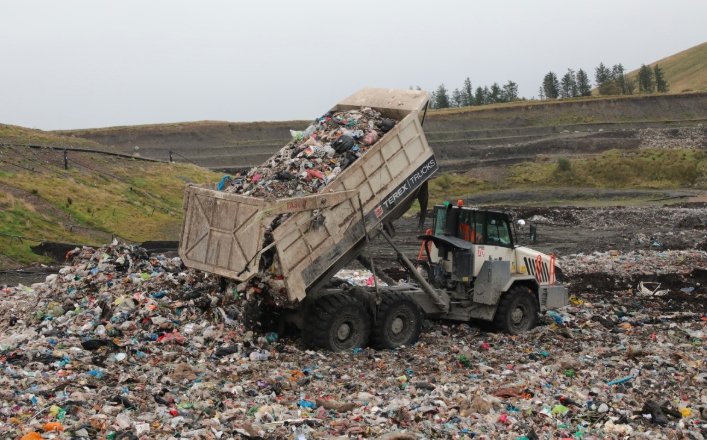Scotland is about to send its black bag rubbish across the Border—by the truckload. Up to 100 lorries a day could roll into England once a sweeping landfill ban kicks in at the end of 2025.
Environmentalists are uneasy. Local authorities are scrambling. And critics say the government’s ambitions may have outpaced its infrastructure.
Ban on Landfilling Biodegradable Waste Triggers Ripple Effect
Come 31 December, burying biodegradable municipal waste (BMW) in Scottish landfill sites will be illegal. That means food scraps, textiles, paper, black bag rubbish—the lot—can’t go underground anymore.
The Scottish Government’s endgame? Slash greenhouse gas emissions from landfill and hit long-term climate targets.
But there’s a catch.
Scotland doesn’t yet have the capacity to deal with all that leftover waste.
Energy-from-waste incinerators were supposed to fill the gap, but there simply aren’t enough. And building new ones? That takes years.
So, for now, much of Scotland’s rubbish will be exported to landfill sites in England.

What’s Actually Being Banned?
The upcoming ban is specific—and sweeping.
It covers:
-
Black bag municipal waste (non-recyclables)
-
Food and garden waste
-
Wood and textiles
-
Paper and card
These materials emit methane when they decompose. And methane’s impact on the climate? It’s around 28 times more potent than CO₂ over a 100-year period, according to the IPCC.
One official said: “This is about long-term climate justice. But right now, the tools aren’t all in place.”
The policy was initially due to start in 2021. COVID and logistical pushback pushed it back by four years.
Where Will All That Waste Go?
Environmental consultants estimate that hundreds of thousands of tonnes of waste currently have nowhere to go. That gap isn’t small—and it’s led to a sharp turn south.
Scotland may need to ship up to 100 truckloads a day into England.
Each truck will likely carry mixed residual waste that can’t be recycled or processed at home.
One industry expert called it “a stopgap that could last longer than planned.”
Another added bluntly, “We’re kicking the can down the road. Just… south.”
Inert waste like ash and rubble will still be permitted in landfills under the new rules. But that’s only a fraction of what’s typically dumped.
Is This Really Temporary?
That’s the million-pound question.
The Scottish Government insists exporting waste is not a long-term solution. Ministers say they are actively ramping up capacity in recycling and energy recovery.
But the numbers tell a different story.
-
Scotland currently has only a few large-scale incinerators
-
New plants take 5 to 7 years to become operational
-
Landfill still handles a significant portion of Scotland’s black bag waste
So, in the near term, the pipeline into England could continue well into 2026 or even beyond.
And it’s not just a logistics issue. It’s also a political one. England’s waste infrastructure isn’t built to be Scotland’s back-up plan forever.
Environmental Groups Push Back
Green campaigners are divided. While many support the landfill ban in principle, they’re deeply uneasy about the cross-border waste shift.
One environmental group called it “policy ambition without delivery infrastructure.”
Another campaigner told Disclosure, “It’s not green to haul waste in diesel trucks across hundreds of miles. This isn’t a circular economy—it’s just a circular excuse.”
Here’s how key groups are reacting:
| Group | Position on Ban | Concern Raised |
|---|---|---|
| Friends of the Earth | Supportive in principle | Lack of domestic treatment capacity |
| Zero Waste Scotland | Backing the move | Urges faster rollout of recycling infrastructure |
| Scottish Environmental LINK | Calls for delay | Says system isn’t ready and emissions may spike |
Still, some say this is a case of growing pains. “Every major shift has friction,” said one climate advisor. “You can’t pivot without bumps.”
What Happens Next?
The ban takes effect on 31 December 2025.
Until then, local councils, waste operators, and government agencies are racing to put contingency plans in place.
Some councils are considering temporary contracts with English landfill operators. Others are trying to divert waste toward existing energy-from-waste plants in northern England.
Meanwhile, construction timelines for new Scottish incinerators are being watched closely. Delays could mean longer reliance on England’s landfills than ministers currently admit.


















